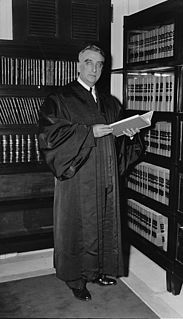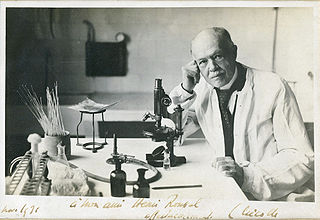A Quote by Emile Durkheim
Whoever makes an attempt on a man's life, on a man's liberty, on a man's honour inspires us with a feeling of horror in every way analogous to that which the believer experiences when he sees his idol profaned.
Related Quotes
Condemn no man for not thinking as you think. Let every one enjoy the full and free liberty of thinking for himself. Let every man use his own judgment, since every man must give an account of himself to God. Abhor every approach, in any kind or degree, to the spirit of persecution, if you cannot reason nor persuade a man into the truth, never attempt to force a man into it. If love will not compel him to come, leave him to God, the judge of all.
It is not the right of property which is protected, but the right to property. Property, per se, has no rights; but the individual - the man - has three great rights, equally sacred from arbitrary interference: the right to his life, the right to his liberty, the right to his property The three rights are so bound together as to be essentially one right. To give a man his life but to deny him his liberty, is to take from him all that makes his life worth living. To give him his liberty but take from him the property which is the fruit and badge of his liberty is to still leave him a slave.
When a man sees a dying animal, horror comes over him: that which he himself is, his essence, is obviously being annihilated before his eyes--is ceasing to be. But when the dying one is a person, and a beloved person, then, besides a sense of horror at the annihilation of life, there is a feeling of severance and a spiritual wound which, like a physical wound, sometimes kills and sometimes heals, but always hurts and fears any external, irritating touch.
Every man, in proportion to his virtue, considers himself, with respect to the great community of mankind, as the steward and guardian of their interests in the property which he chances to possess. Every man, in proportion to his wisdom, sees the manner in which it is his duty to employ the resources which the consent of mankind has intrusted to his discretion.
It is altogether unlawful to kill oneself... Wherefore suicide is contrary to the inclination of nature, and to charity whereby every man should love himself... Life is God's gift to man, and is subject to His power, Who kills and makes to live. Hence whoever takes his own life, sins against God... for it belongs to God alone to pronounce sentence of death and life.
And this is the ultimate lesson that our knowledge of the mode of transmission of typhus has taught us: Man carries on his skin a parasite, the louse. Civilization rids him of it. Should man regress, should he allow himself to resemble a primitive beast, the louse begins to multiply again and treats man as he deserves, as a brute beast. This conclusion would have endeared itself to the warm heart of Alfred Nobel. My contribution to it makes me feel less unworthy of the honour which you have conferred upon me in his name.
Every man that tried to destroy the Government, every man that shot at the holy flag in heaven, every man that starved our soldiers... every man that wanted to burn the negro, every one that wanted to scatter yellow fever in the North, every man that opposed human liberty, that regarded the auction-block as an altar and the howling of the bloodhound as the music of the Union, every man who wept over the corpse of slavery, that thought lashes on the naked back were a legal tender for labour performed, every one willing to rob a mother of her child - every solitary one was a Democrat.
I suspect it was...the old story of the implacable necessity of a man having honour within his own natural spirit. A man cannot live and temper his mettle without such honour. There is deep in him a sense of the heroic quest; and our modern way of life, with its emphasis on security, its distrust of the unknown and its elevation of abstract collective values has repressed the heroic impulse to a degree that may produce the most dangerous consequences.





































